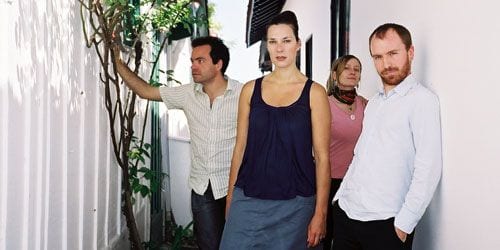
As a title, Monstre Cosmic sounds like a hybrid genre picture, perhaps “science-fiction-film-noir”. As an album, it sounds more like a Sunday in the country — or a strange dream synched to the soundtrack of Sundays in the country — If your day trips and dreams were documented by David Lynch.
In fact, Monade’s Laetitia Sadier cites Lynch’s Inland Empire as one inspiration for the album. That connection makes sense in the context of the vaguely disturbing, yet somehow still soothing, and intriguing but often inscrutable musical shifts. The lines between waking and sleeping, real and imagined, mellow and monstrous blur like trees and fence-posts flashing past on a rural straightaway.
Monade began as a side project for Stereolab singer Sadier. Now, her band includes Marie Merlet on bass, Nicolas Etienne on keys and guitar, and David Loquier on drums. This lineup plays on six of Monstre Cosmic‘s ten tracks. The remaining songs are the result of Sadier’s collaborative efforts with Julien Gasc and Emmanuel Mario of electro-pop group Momotte.
The aptly named “Noir-Noir” opens this aural adventure, and though it’s only 53 seconds long, it perfectly sets the scene by evoking those moments of overlapping consciousness experienced when one is either entering or emerging from a dream state. Gentle waves of piano, splashes of strings and swells of percussion wash over the listener like the sensation of waking up and slowly swimming to the surface of awareness.
If this awakening is literal or philosophical is thrown into question on “Étoile”, an entrancing meditation on the interdependence of darkness and light. “Étoile” is sung entirely in French (as are many of Monstre Cosmic‘s tracks), which only adds to its dreamy ambience, whether or not you understand the meaning of the lyrics. “Lost Language”, fittingly, follows and calls to mind images of a frantic freeway flight from modern, urban life, with its driving pace, eerily accelerating strings, and tense, chaotic snippets of spoken word. The surrealistic exodus continues as evolutionary commentary on the cleverly titled “Elle Topo”, as Sadier intones lyrics like: “Power to transform / Human animal / Into human god / Into evil man” and “When God / Was a / Woman / A bold goddess / To bring consciousness / Nothing ended”.
The tone lightens, the mood lifts, and the scenery becomes more bucolic on “Messe Joyeuse”, but “Regarde” contradicts its cheery melody with a dark look at that subconsciousness from which we sprang, the beast within. “Invitation” offers further regression, as a return to our origins, and the river reclaims our souls with “Pure matter / Transforming into clay / Absolving / Reflecting / Mirror of Reality / Unifying / All the Way / Where we can let life be”. “Tout En Tout Est Un” is apparently about what happens when we rejoin the collective source; unfortunately, it sounds like stumbling, stoned, through someone else’s back garden … tripping, trespassing, trying not to throw up.
“Entre Chien Et Loup” (“Between Dog and Wolf”) features some gorgeous harmonies and great guitar work, but otherwise seems odd and quite out of place thematically. Surely, it is meant to be. “Change of Destination” quickly restores the faraway vibe with swirling, almost psychedelic organ and whimsical wondering and wandering. Sadier and Rachel Ortas (Luna Parker) call and respond, “Where did I go? / Where did I go? / I was running away / I was hiding away/ I was swimming away / Into the sea” before the music is replaced by the sounds of traffic, public address systems, footsteps and conversation. Then there is seven minutes of silence before a sudden, startling hidden track starts to play. It is discordant. It is unnecessary. It is shockingly routine and strangely original. It is decidedly Lynchian.
Welcome back to the modern world.

![Call for Papers: All Things Reconsidered [MUSIC] May-August 2024](https://www.popmatters.com/wp-content/uploads/2024/04/all-things-reconsidered-call-music-may-2024-720x380.jpg)



